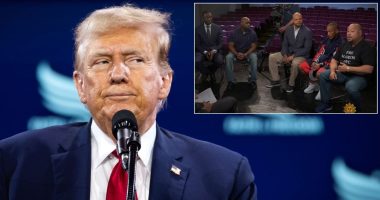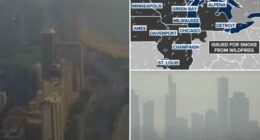
Inset Left: FILE – Gov. Glenn Youngkin, R-VA., gestures before speaking during the first day of the Republican National Convention, Monday, July 15, 2024, in Milwaukee (AP Photo/J. Scott Applewhite, File). Inset Right: FILE – Chief Justice of the United States John Roberts joins other members of the Supreme Court as they pose for a new group portrait, at the Supreme Court building in Washington, Oct. 7, 2022 (AP Photo/J. Scott Applewhite, File). Background: Background: FILE — The Supreme Court of the United States is seen in Washington, March 26, 2024 (AP Photo/Amanda Andrade-Rhoades, File).
The U.S. Supreme Court on Wednesday allowed Virginia to continue purging voter rolls by granting an emergency stay request — unpausing a pause issued and affirmed by two lower courts.
Late last week, the U.S. District Court for the Eastern District of Virginia blocked the commonwealth from continued voter roll purges by issuing a preliminary injunction. Over the weekend, the Fourth U.S. Circuit Court of Appeals upheld the injunction.
On Monday, Virginia asked Chief Justice John Roberts to allow the purges to continue under the purview of Executive Order 35. Under that directive, which interprets a 2006 law, election officials had begun removing “individuals who are unable to verify that they are [U.S.] citizens to the Department of Motor Vehicles” from the state’s lists of voters eligible to participate in the upcoming election.
On Tuesday, the U.S. Department of Justice and civil rights groups pleaded with the justices to keep the executive order enjoined. Numerous other briefs were filed for and against the purge and the pause.
In a terse, one-paragraph ruling, which foregoes any analysis of the merits — opting to instead simply restate the procedural posture of the litigation — the high court ruled in the Old Dominion’s favor.
“The application for stay presented to The Chief Justice and by him referred to the Court is granted,” the order reads. “The October 25, 2024 order of the United States District Court for the Eastern District of Virginia, is stayed pending the disposition of the appeal in the United States Court of Appeals for the Fourth Circuit and disposition of a petition for a writ of certiorari, if such a writ is timely sought. Should certiorari be denied, this stay shall terminate automatically. In the event certiorari is granted, the stay shall terminate upon the sending down of the judgment of this Court.”
While the order, the only such order issued by the court on Wednesday, does not list the justices who voted in favor of the stay, at least four would have been required to obtain a majority vote in favor of the emergency application. That’s because all three Democratic Party-appointed justices voted to deny the application.
“Justice Sotomayor, Justice Kagan, and Justice Jackson, would deny the application,” the order explains.
Under the terms of the high court’s order, the injunction has no chance of being reinstated until the appellate court first dispenses with and decides the case on the merits — and the Supreme Court itself then takes the case up on the merits or declines to take it up altogether. None of those potentialities are likely to occur before Election Day, which is Nov. 5.
The commonwealth will now be able to continue removing registered voters who are believed to be non-U.S. citizens. To date, some 1,600 people have been removed from the rolls since the executive order was issued by Gov. Glenn Youngkin, a Republican, in August. It is unclear how many would-be voters will be affected by the ruling.
Youngkin, in a statement, praised the court’s move.
“We are pleased by the Supreme Court’s order today,” the elected official said in a post on X (formerly Twitter). “This is a victory for commonsense and election fairness. I am grateful for the work of Attorney General [Jason Miyares] on this critical fight to protect the fundamental rights of U.S. citizens. Clean voter rolls are one important part of a comprehensive approach we are taking to ensure the fairness of our elections. Virginians also know that we have paper ballots, counting machines not connected to the internet, a strong chain of custody process, signature verification, monitored and secured drop boxes, and a ‘triple check’ vote counting process to tabulate results. Virginians can cast their ballots on Election Day knowing that Virginia’s elections are fair, secure, and free from politically-motivated interference.”
While the court’s order wholly eschewed any kind of justification for issuing the stay, the decision is hardly a surprise.
The Roberts Court has been loath to sign off on election-eve changes to state election law — particularly changes issued by federal courts.
While numerous issues are at stake in the case, the area of election law that has often motivated the court’s conservative majority in such cases is the Purcell principle — the notion that courts should be cautious and hesitant to make substantial changes to state election rules in the time period just before an election.
The staying power of the doctrine has become increasingly clear as the principle is now largely cited — by proponents and opponents — in a restated form popularized by Justice Brett Kavanaugh in 2022.
While an inconsistently applied admonition from the justices, Kavanaugh summarized the Purcell principle as standing for the proposition that “federal district courts ordinarily should not enjoin state election laws in the period close to an election.”
Kavanaugh’s definition continues:
When an election is close at hand, the rules of the road must be clear and settled. Late judicial tinkering with election laws can lead to disruption and to unanticipated and unfair consequences for candidates, political parties, and voters, among others. It is one thing for a State on its own to toy with its election laws close to a State’s elections. But it is quite another thing for a federal court to swoop in and re-do a State’s election laws in the period close to an election.
Have a tip we should know? [email protected]







